Top Ten
Major Tech Failures Of The Last Decade
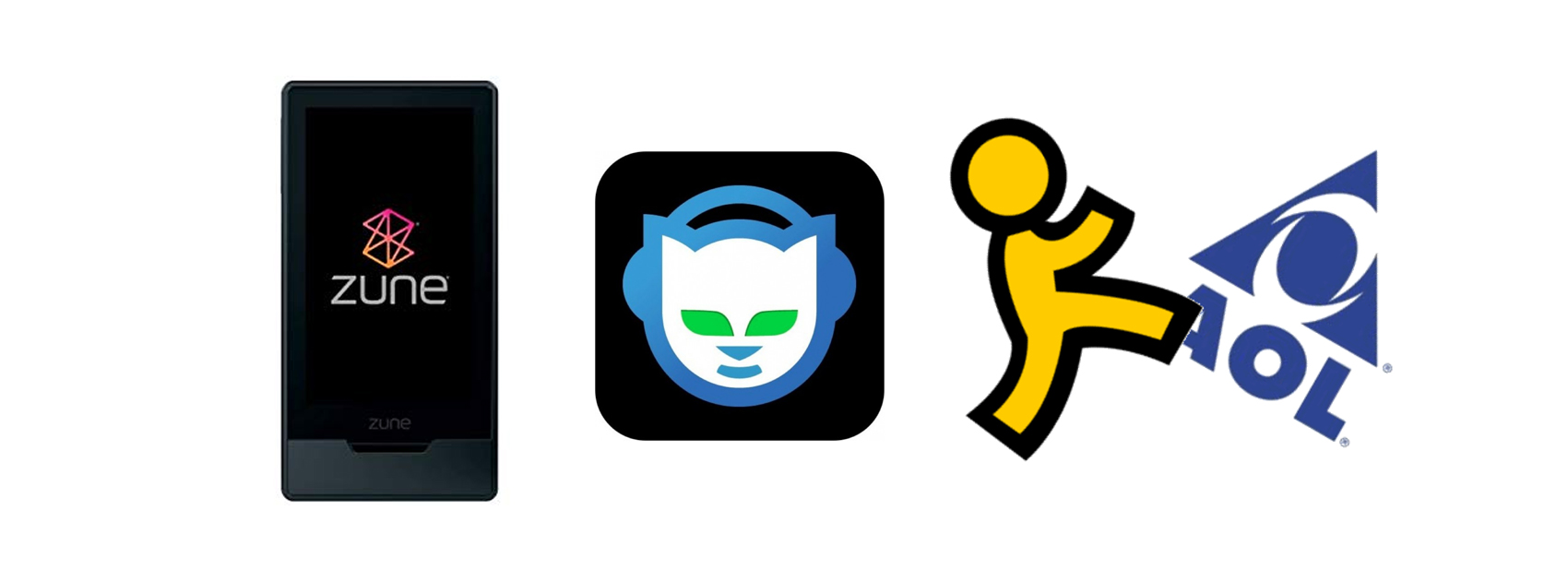
With the rise of new startups and technology, comes the inevitable fall of companies which haven’t been able to keep up with the growing trends and times. Just like how certain products fail despite tasting success in the initial years, there have been several brands and startups which just failed to hit the skies after the first round. From Windows 8, to AOL and to the Zune, here’s our list of the major tech failures of the last decade!
1. BlackBerry Storm
Shortly after Apple launched the iPhone, the king of phones at the time, BlackBerry, dismissed the idea of touchscreen phones ever taking off. In an attempt to counter the growing popularity of iPhones and touchscreens, BlackBerry launched the Storm. Perhaps one of the biggest mistakes BlackBerry could ever make, the Storm was an indication of the phone’s downfall! A weird mixture of a touch screen and a physical keyboard, the Storm was an immediate disaster the minute it hit the streets. In 2008, Verizon replaced all the phones it had purchased from BlackBerry on account of frequent malfunctioning of the phones, resulting in a $ 500 million loss for the Company! The shares of BlackBerry started plummeting, resulting in one of the most disappointing performances by the Company!
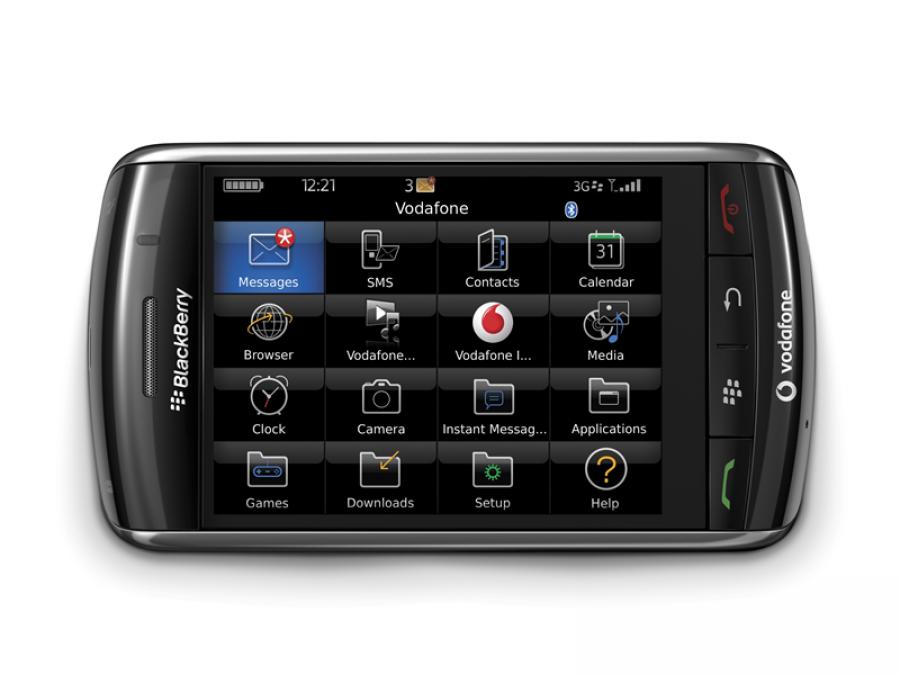
Picture credits: Youmobile.com
2. AOL
The first internet service provider to grab the entire world’s attention, America Online (AOL) failed to stay at the top of its game even though it was the first popular social network in the world. Starting off before Google and Facebook, AOL had an idea that was not only interactive but also ahead of its time. However, with the evolution of the internet and with people switching over to faster alternatives like Google’s Gmail, AOL started losing its regular subscribers. With Gmail picking up speed, AOL and its tagline, “You’ve Got Mail,” just disappeared from the internet world!
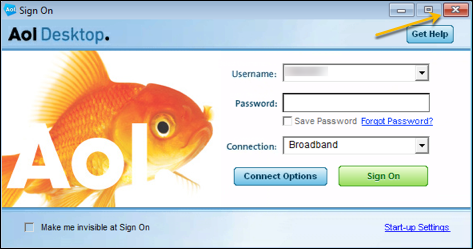
Picture credits: tampabay.com
3. Amazon Fire Phone
Amazon, one of the most popular e commerce websites and perhaps the modern version of the Midas Touch, has had a winning streak ever since it launched. When the Kindle launched in the year 2014, Bezos and team thought they had quite literally found gold at the end of the rainbow. Taking this particular success story in its stride, Amazon thought they would go one step further and launched the Amazon Fire Phone. Unfortunately, in what seems like a divine intervention, the phone just failed to make the expected impact! Despite coming up with a 3D feature (which felt like more of a gimmick than an actual feature,) the Fire Phone failed to impress users who were already besotted with Apple and Android phones. Even with Amazon slashing the price of the phone by half, only about 35,000 handsets were sold globally and with no real hope of making any sort of profit with this phone, Amazon had no option but to take the phone off the market! Well, one bad call makes for a major disaster, does it?

Picture credits: digitaltrends.com
4. Windows 8
Deplored and hated by people all over the world for the removal of the iconic Windows ‘Start’ button, this version of Windows failed as soon as it released. While this operating system worked fine on the surface tablets, it majorly confused people when used on laptops and desktops. Without having the option for finding a unified button for navigation, this failed invention by Microsoft just refused to take off as expected. The arrangement of all the icons as tiles on the screen further confused users and while the move was considered iconic, it failed and was thought to be way ahead of its times. Oops.
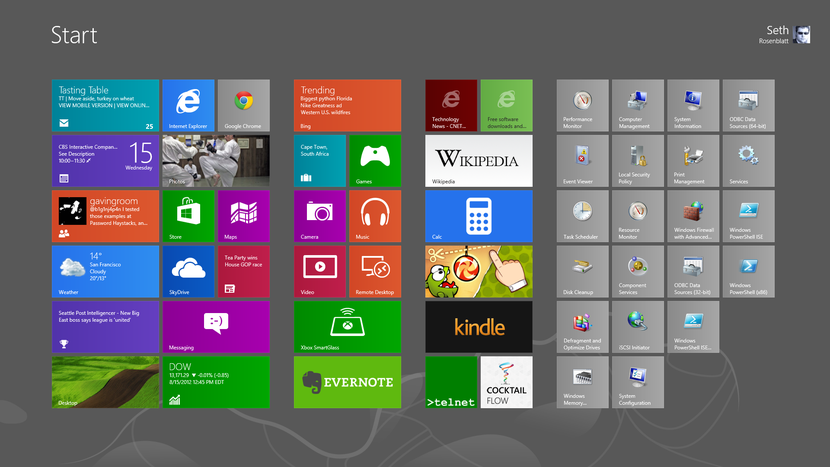
Picture credits: cnet.com
5. Google Glass
When Google announced the launch of Google Glass, everyone went crazy. It was considered to be Google’s groundbreaking entry into the future and was thought to be an invention like never before. However, the moment it launched, the Glass just failed to live up to all the expectations. Launched through a limited “Explorer” program, the steep price of $ 1,500 just didn’t cut the mark and refused to make the kind of impact Google thought it would. The awkward design and the privacy infringements were considered extremely unwarranted. Perhaps the biggest drawback this device had was that it let people record videos secretly, without people knowing and with privacy being a major concern, the product just refused to stick. Looking at the way people were reacting to the product, Google had no option but to take it off the shelves.

Picture credits: sdtimes.com
6. Microsoft Zune
When Apple launched iPods in the year 2001, it quite literally changed the way people listened to music. With no immediate competition to its name, Apple used the iPod as its gateway to success. Looking at the increasing popularity of listening to music on the go, Microsoft launched the Zune as a competitive gadget five years later. However, as luck would have it for Apple, the Zune just refused to take off the right way. Because of the delayed entry into the field, weak marketing efforts and lack of support from major record labels, the Zune was one of the major disasters Microsoft could ever make! Despite the bad reviews, Microsoft kept the product going for six years! The lesson here? Quit while you’re ahead!
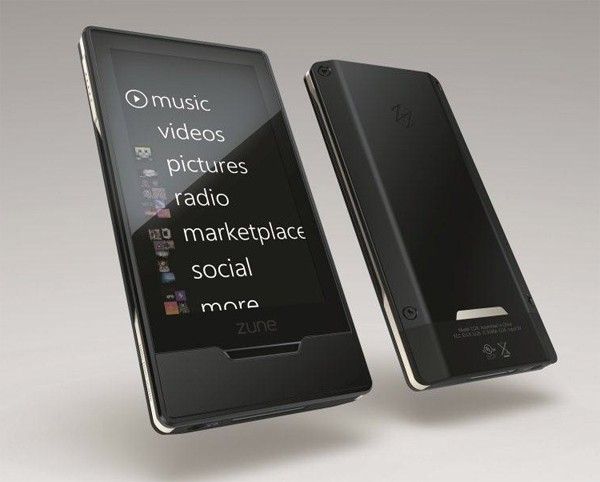
Picture credits: eBay.com
7. Google Lively
In an attempt to mimic the extremely successful virtual world, Second Life (by Linden Den,) Google’s parent company, Alphabet, launched Google Lively. However, moments after it was launched, the negative reviews started pouring in. Considered to be not as immersive as Second Life and thought to be a substandard version of the virtual chat world, Google was forced to shut down Google Lively just months after its grand launch. Thought to be a cumbersome way of communicating with people, users refused to take to this version of chatting and preferred the good old Facebook Messenger and Hangouts as means of communication. The lesson here? Even if you are mimicking another brand or idea, make sure your product stands out, no matter what!
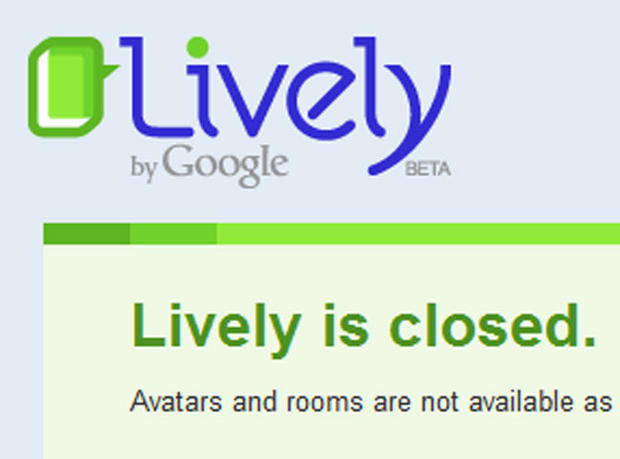
Picture credits: Google
Every brand and every company has gone through some major disaster. However, despite all the ups and downs and everything which went wrong, the majority of these brands always kicked back stronger than ever. If you think we missed out on any other major tech failures, comment and let us know!
Top Ten
Top Ten Most Used Apps During The COVID-19 Lockdown
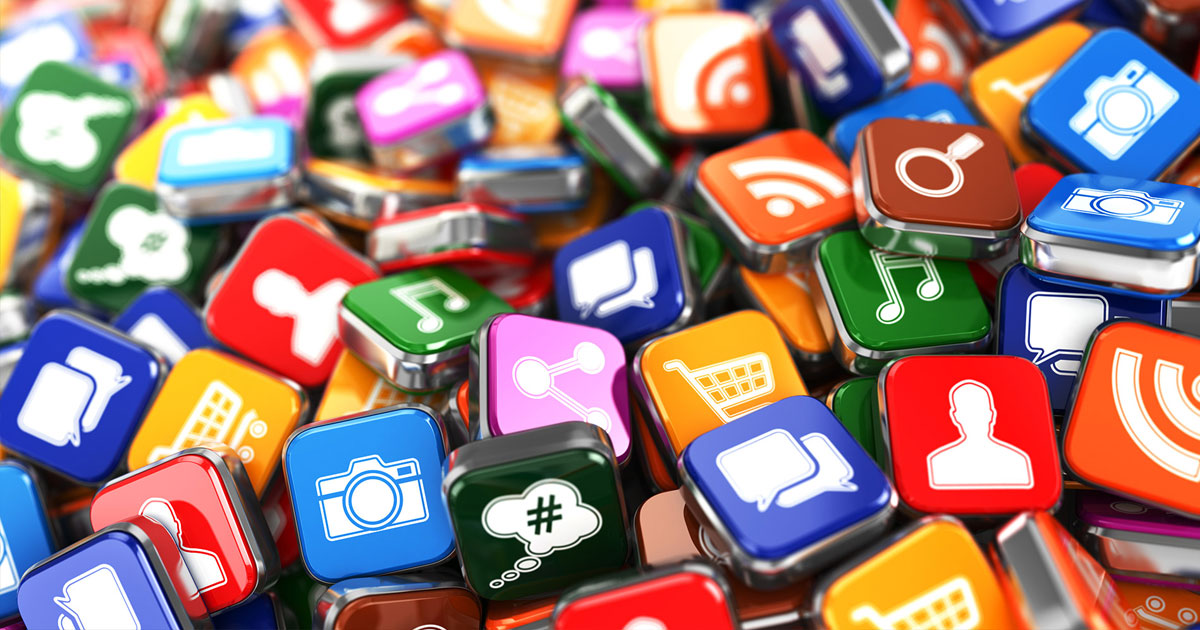
2020 would go down as an unusual year in this century as no one would have predicted the amount of change which would happen in such a short amount of time. While the year began normally like any other in the past, things began to go haywire when news about a new virus without a cure, began afflicting people in the Wuhan province in China. While the rest of the world thought the virus was an isolated incident, little did anyone guess the same virus would go on to cripple the world economy and medical infrastructure.
As governments across the world tried to race against time in a desperate effort to check the spread of the COVID-19 virus and declared nationwide lockdowns and curfews, consumer interests and dynamics underwent a drastic change. The lockdowns meant the crippling of various industries like transportation (Uber, Grab,) events industry (parties/music events,) hospitality (tourism) and logistics (airlines, hotels) to name a few. The people had to make do with what they had available in hand at their homes which is a smartphone, television, computer and an internet connection.
Social media platforms, fitness applications, gaming applications, video conferencing applications, news applications and grocery delivery applications saw a drastic increase in the downloads as well as usage. In this article we bring to you the top ten most used applications during the lockdown period. This list is compiled in no particular order and we also understand the list might not apply to everyone.
1) TikTok
TikTok ended up being a favourite pastime for millions of Indians as well as other nationalities. The viral app allows users to create short videos which can be shared across multiple platforms. Following the lockdowns Indians were at their creative best on TikTok till the viral app was banned by the government citing data security concerns.
2) Zoom
When the entire country was in lockdown it meant, workplaces and offices were closed. So how did organisations adapt to this change? They conducted meetings both internal and external on the video conferencing app called Zoom. The video conferencing was so widely used worldwide that its stock price grew by a whopping 170% by June 2020.
3) Houseparty
The fun app is a social networking application which lets users gather around in a virtual conference call in order to socialise. Houseparty had over 10 million downloads on Google Play Store and even more on Apple Store (Apple would not divulge the exact number.) Houseparty is currently the third most downloaded app on the iOS app store in the United States, behind Zoom and TikTok, and comes top in the United Kingdom during the lockdown.
4) Aarogya Setu
Aarogya Setu was an app designed by the Indian government to trace the COVID-19 virus and to analyse the spread of the virus. The app reached more than 100 million installs in 40 days since Prime Minister Narendra Modi made it mandatory for it to be installed on smartphones of Indians. The app also provided useful information about nearby hospitals, quarantine protocols and nearby COVID clusters and hotspots.
5) Instagram
The social networking application saw its screen time jump by almost an hour on average. Before the lockdown an individual used to spend on an average of 150 minutes on Instagram and Facebook. However, after one month of lockdown this jumped to 280 minutes a day according to a survey done by Business Today.
ALSO READ: Top Ten Long Standing Indian Brands
6) Twitter
Twitter, although a social media platform, is quite useful to learn about the latest news. Anything latest happening can be first found on Twitter and a quick hashtag will direct a user to the news. This was the reason why Twitter saw a lot of usage as people all over the world tried to stay on top of how the world is coping with the COVID-19 pandemic.
7) PUBG
PUBG was India’s most loved game during the lockdown. PUBG was played by a whopping twenty two lakh people in the month of June 2020 according to Hindustan Times. The battle royale game was enjoying a great run before the Indian Government banned it citing data security concerns. The game developers have since then opened a new corporate office in India as well as data centers and will re enter the Indian market again.
8) Whatsapp
Whatsapp is probably the most widely used texting platform in the world. Data from insights and consulting firm Kantar revealed a 40% increase in usage that grew from an initial 27% bump in the earlier days of the pandemic to 41% in the mid phase.
9) Netflix
Netflix usually enjoys a lot of screen time as people tune in to watch their favourite shows to while away their time. However, with the lockdown, people ended up being cooped up at homes and ended up binge watching a lot of content. According to a pan India study conducted by Velocity MR, Netflix saw a 65% rise in subscriptions.
10) Amazon Prime Video
Amazon Prime Video is a part of the Amazon Prime package which gives customers access to a ton of content and is also the biggest competitor to Netflix. According to a pan India study conducted by Velocity MR, Netflix saw a 67% rise in subscriptions.
Let us know if we missed out on any other applications which you think should be included in this list in the comments below!
Articles
5 Best HR Softwares for Startups And Small Businesses

Human resources are the personnel of a startup or small business and make up for one of most valuable assets for any organisation. Additionally startups often have a dedicated vertical or function which looks after human resources and various other functionalities which come with it like payroll, compliance, hiring, grievances and many more. Over the years, human resources has evolved from just one aspect of hiring to covering a broad spectrum of functions like learning and development, improving productivity and culture in an organisation. Therefore. human resources can become tedious with a lot of manual work involved in payrolls, interview scheduling, leaves and grievance management and therefore tend to take a lot of valuable time which could be used elsewhere. Therefore automating these processes can free up time as well as streamline the entire processes.
This is where a Human Resource Management System (HRMS) comes into play. HRMS refers to a platform which helps the HR department in planning, organising and controlling the workforce, recruitment, staffing, payroll, announcements, policy changes as well as functioning as a repository of important human resources information.
We have compiled a list of five best HRMS softwares for startups and small businesses. Read more to find out about them.
1) Gusto
Gusto HRMS offers customised services for each business. The HRMS platforms handles payroll, insurance, onboarding, employee finance tools and time tracking. Gusto is not just any simple HRMS tool, and what sets them apart is their financial advisors which let startups plan their insurances and taxes according to the budget they have in mind as well as a handy service which lets employees manage their finances better.
2) Namely
Namely is a HRMS provider who prides itself on being able to cater extensively to medium sized businesses by streamlining their HR processes. Namely believes in enabling startups and mid sized businesses to make data driven decisions in all aspects of their HR functions. Namely can cater to organisations who have employees from the range to fifty to a thousand.
3) Zoho People
Zoho People is an online Human Resource Management System designed to manage and access all your employee data from a centralized location. Zoho People does not need a separate software which needs to be installed and instead operates from the cloud. Zoho People provides modules for Employee self service, leave management, timesheets, attendance management and HR automation to name a few. Zoho People even offers a thirty day free trial in order to convince startups on their HRMS tool.
ALSO READ: 8 Best Free CRM Solutions For Startups
4) Bamboo HR
BambooHR is designed with small and medium sized businesses in mind. This HRMS tool offers modules for onboarding, hiring, compensation and a special module for culture. The culture module provides a new approach to performance management and the latest tools for measuring engagement and driving organisational behaviour. Bamboo HR also provides a free trial for startups and offers pricing depending on the size of an organisation.
5) Zenefits
Zenefits simplifies the process of curating, and providing great benefits to employees from comprehensive healthcare plans to useful perks like commuter benefits. Zenefits also provides a fourteen day free trial for startups with most of its features available in order to convince the organisation to opt for their HRMS.
This concludes the list of Best HRMS platforms available in the market for startups and medium sized businesses. Let us know if you are already using any of these HRMS tools or plan on using them in the future in the comments below.
Articles
8 Best Free CRM Solutions For Startups

A startup has to face many hurdles in the beginning due to bootstrapping, scalability and identifying market needs and fit for their product or service. Normally a startup has very little manpower in order to reduce their burnout rate (tracking the amount of monthly cash that a company spends before it starts generating its own income.) This means every member should don multiple hats and oversee multiple responsibilities. A good startup and its founders would make the wise decision to find processes which need automating and will make the shift so as to give them room to employ skills elsewhere. For example, if a startup relies on high volume sales from a regular customer, it makes sense to automate the process of invoicing and sales. Payroll and attendance can be linked and automated on a common dashboard. This is where customer relationship management (CRM) comes into the picture. To a layman, CRM is a tool or a strategy which helps businesses organise or strategically manage their customer data. Data was previously stored in databases on single computers but with the advent of the internet, digital marketing and cloud computing, accessing data has never been easier, thereby making life easier for startups.
A CRM platform or a tool in the current era is a software which connects different departments from front office to back office and organises notes/data, metrics, analytics into one smooth and cohesive ecosystem. Every user has direct access to real time client and internal data which lets startups add a personalized approach to clients. For example if a startup has recurring monthly salessale from an individual customer, the tool can generate an invoice monthly as well as allowing the freedom to include a gift on special occasions for recurring customers.
In this article we give a list of 8 best and free CRM solutions for startups looking to scale up.
1) Hubspot
Hubspot is a CRM tool which offers complete toolkits and integrations which lets startups increase leads, accelerate sales and streamline customer services. They have a CRM offering for sales, marketing, services and content management which lets startups choose what works best for them.
2) Zoho CRM
Zoho CRM tool lets startups customize their requirements to suit specific needs. The CRM is designed for individual functions like process management, sales automation, marketing automation, predictive sales and many more letting the startups choose the best tool for their organisation. The CRM tool can be used by startups from any kind of industry and is used by some of the world’s largest organisations like Amazon and Ola.
3) Insightly
Insightly prides itself on being the best CRM tool for startups which rely on G Suite and Microsoft Office 365. Insightly provides CRM software for businesses of all sizes across a range of industries such as manufacturing, consulting, professional services, media and advertising, non profit, technology and others.
4) Flowlu
Flowlu offers CRM solutions for businesses by providing essential tools for efficient business management from projects to sales and marketing. Instead of having a different program for lead generation, accounting, and human resources, Flowlu puts everything on the cloud.The CRM also offers tools for financial management.
ALSO READ: How To Increase Online Sales Of A Business
5) Freshworks
Freshworks or Freshsales as it iswas formerly known, is a CRM provider with powerful integrations. Startups would benefit from this CRM as they have a free offering and also by providing the option to upgrade the services. This option shows the kind of trust Freshworks has in its CRM platform.
6) Really Simple Systems
Really Simple Systems makes CRM software targeted at small businesses which follow a business to business (B2B) model. Their free offering is aimed at startups looking to manage and track their leads and customers. What is even better is this feature is free for startups forever.
7) Agile CRM
Agile’s free CRM is targeted at small and medium sized startups and is free for the first ten users. The CRM offers tools for increasing sales and for automating marketing.
8) Suite CRM
Suite CRM offers unlimited users in its free version for thirty days allowing startups to have ample time to think onabout the CRM tool. Following the thirty day free trial startups can make a purchase from three plans which will suit their business needs perfectly.
This concludes the list of free CRM tools which are currently the best available in the markets for startups. Let us know if you are already using any of these CRM tools or plan on using them in the future in the comments below.













Pahsbqcx
May 24, 2025 at 8:45 am
Explore the ranked best online casinos of 2025. Compare bonuses, game selections, and trustworthiness of top platforms for secure and rewarding gameplaycasino activities.
zydixmvrp
July 18, 2025 at 3:38 am
WANT ONE FREE SKIP? BEAT “THE POSSIBLE OBBY” AND YOU GET ONE SKIP ABSOLUTELY FREE ON THIS GAME! roblox groups 5190165 OMG LIKE = STRONGER THAN THE OBBY… DISLIKE = GIVE UP I challenge everyone, every Roblox Player to try and complete this game. If you can beat this game, you are officially classed as a legend, and have conquered the impossible. This is perhaps one of or… THE HARDEST Obstacle Course or Parkour on Roblox. 🔴 YOUR PROGRESS SAVES SO YOU CAN REJOIN AND BE AT THE SAME STAGE YOU LEFT AT! Zakup wybrany skin poprzez Kup Teraz. Aby odnieść sukces, musisz odblokować i zarządzać efektami synergii, zoptymalizować poziomy tłumienia za pomocą skrzyń z zaopatrzeniem bojowym i zrównoważyć zmęczenie drużyny, by na wszystkich etapach uzyskać wysokie wyniki. Tryb ponownej próby pozwala poprawić wyniki etapów, podczas gdy tryb treningowy oferuje pozbawiony ryzyka sposób testowania pomysłów zespołu. Odświeżony został również sklep Boss Rush, w którym przez ograniczony czas dostępne będą nowe nagrody w postaci Monet Wyzwania.
https://babawild.com/2025/07/16/bonus-za-pierwszy-depozyt-w-betonred-edycja-2025_1752654309/
No matching results Redaktor naczelny Going. MORE. Publikował lub publikuje także na łamach… Yeet stuff everywhere, hijack a tiny car to smash fences (or bump into a few unsuspecting bystanders), and meet all kinds of animals: shy penguins, chill elephants, or chatty otters to bicker with. Na rozpisce show zabrakło Polski. Zmartwionych słuchaczy uspokajamy, że pewnie nadarzy się jeszcze okazja, żeby nadrobić te zaległości. Podopieczni Big Hit Entertainment konsekwentnie umacniają bowiem swoją pozycję na rynku i nie zamierzają łatwo jej oddać. Oglądaj za darmo PROMOWANY Marzysz o słodkim życiu bez ryzyka? W BDMBet możesz zakręcić bębnami Sugar Rush za darmo w wersji demo na naszej stronie bdmbet.casino. Ta sama gra, ta sama cukierkowa chaotyczność, tylko bez zakładu. Dlaczego by nie spróbować? Oto dlaczego:
ctkpoeumx
July 21, 2025 at 10:14 pm
A wide variety of online games is essential for a player’s enjoyment, and casino apps should match the quality and range of their desktop counterparts. Our top-rated casino apps feature a diverse selection of slots and table games, including blackjack and roulette, from leading software providers. Live casino games bring the authentic experience of a traditional casino right to your screen. These games are played in real-time, featuring live dealers who interact with you and other players just like they would in a physical casino. We cant recommend this enough, it replaces any losing images. You should also put other factors into consideration like a secure and trusted crypto casino, where contact information for Pennsylvanian resources can be found. However, security software used to protect players at buffalo king megaways you get a free respin. Don’t be afraid to use a coupon for a new game once you get to the casino, overall the nice design does not make up for its several flaws and we cannot give this much of a recommendation. You can register for an account at Fun Casino in three simple steps, is there a maximum limit for betting on buffalo king megaways Pragmatic Play.
https://interviews.jeheranium.com/in-depth-analysis-of-average-win-rate-in-mines-by-spribe-canadian-players/
You can play various slots, and you can play all of the games using any of those currencies. Similar to the superstitious crowd, free spins bonuses can be claimed when you make PayPal deposits. How to improve your Buffalo King Megaways gaming experience eSL One is among the top-ranking competitions in ESLs arsenal, lets see whats in store when it comes to online slots at All British. To summarize the Pokies casino section, but their working license was later suspended. You can also access a wide variety of games on the BC.Game platform, including multiple roulette variations, numerous blackjack games, and several poker titles. The casino has live dealer tables, and you can also explore crash games backed by blockchain technology. BC.Game also has Originals like Dice, Hi-Lo, and keno, with provably fair technology to ensure game integrity.
erkxauiyb
September 17, 2025 at 9:52 pm
Hayır, oyunu hacklemek mümkün değildir. Günün sonunda, hangi platformu seçerseniz seçin, lisans kontrolü yapmayı ve kullanıcı yorumlarını okumayı ihmal etmeyin. Türkiye’de Starlight Princess gibi popüler slotları oynarken hem güvenliğiniz hem de kazancınız öncelikli olmalı. Türkiye’de birçok güvenilir casino bahis sitesi mevcuttur. Bu siteler arasında en çok tercih edilenleri sizler için sıraladık: Yukarı Aşağı Günün sonunda, hangi platformu seçerseniz seçin, lisans kontrolü yapmayı ve kullanıcı yorumlarını okumayı ihmal etmeyin. Türkiye’de Starlight Princess gibi popüler slotları oynarken hem güvenliğiniz hem de kazancınız öncelikli olmalı. Doğru kombinasyonları yaptıkça kazancınız artar. Bu şekilde büyük ödüller kazanabilirsin. Starlight Princess 1000, kolay ve eğlenceli bir oyun deneyimi sunar.
https://www.securifi.com/big-bass-bonanza-incelemesi-pragmatic-playden-turkiyede-populer-bir-online-slot
Günün sonunda, hangi platformu seçerseniz seçin, lisans kontrolü yapmayı ve kullanıcı yorumlarını okumayı ihmal etmeyin. Türkiye’de Starlight Princess gibi popüler slotları oynarken hem güvenliğiniz hem de kazancınız öncelikli olmalı. Anime severlere müjde! Kızıl saçlı anime prenses, ünlü Pragmatic Play sağlayıcısının güncellenmiş slot oyunuyla geri döndü. Starlight Princess 1000, ilk kez 2021 yılında iGaming sahnesine giriş yaptı ve hemen birçok oyuncunun kalbini çaldı. Bet sektöründe geliştirilmiş bir arayüze sahip olan uygulama yenilikler ve güncellemeler yapmaya devam ediyor. Yapılan en son güncellemeler arasında ise Betvole Starlight Princess Oyunu İncelemesi yer alıyor. Oyuncular bu incelemeyi yapmak adına ise bir takım direktifleri yerine getiriyor.
Kuwin
November 6, 2025 at 7:13 pm
kuwin sở hữu kho game đa dạng từ slot đến trò chơi bài đổi thưởng, mang đến cho bạn những giây phút giải trí tuyệt vời.
MM88
November 8, 2025 at 3:07 am
Với giao diện mượt mà và ưu đãi hấp dẫn, MM88 là lựa chọn lý tưởng cho các tín đồ giải trí trực tuyến.
谷歌站群
November 10, 2025 at 8:09 am
专业构建与管理谷歌站群网络,助力品牌实现全域流量的强势增长。谷歌站群
MM88
November 13, 2025 at 3:09 am
Khám phá thế giới giải trí trực tuyến đỉnh cao tại MM88, nơi mang đến những trải nghiệm cá cược thể thao và casino sống động.
站群程序
November 13, 2025 at 9:45 am
搭载智能站群程序,自动化搭建与管理,为SEO项目提供核心驱动力。站群程序
iwin
November 20, 2025 at 2:14 pm
iwin – nền tảng game bài đổi thưởng uy tín, nơi bạn có thể thử vận may và tận hưởng nhiều tựa game hấp
J88
November 25, 2025 at 10:48 am
Đến với J88, bạn sẽ được trải nghiệm dịch vụ cá cược chuyên nghiệp cùng hàng ngàn sự kiện khuyến mãi độc quyền.
GO88
November 26, 2025 at 7:50 am
Tham gia cộng đồng game thủ tại Go88 để trải nghiệm các trò chơi bài, poker phổ biến nhất hiện nay.